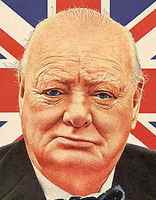
As a graduate of Winston Churchill High School, I have always felt an eerie kinship with the great prime minister. Here was a man of such great importance that his moniker would adorn a high school in suburban Maryland. I can't think of very many foreigners who have an American public school named after them, but there are indeed more than one WCHS' in the United States.
I look up to Churchill for various reasons--his steely leadership over England during WWII, his strength in the face of an evil enemy, his ability to unify his countrymen in their most trying hour. And on a personal level, his marriage to his wife that lasted over forty years. I can only imagine what the two of them faced together.
And so, I was excited to read an essay by Churchill in a collected anthology of essays that I borrowed from the library. The title of the piece is called "The Dream" and it is about an imaginary conversation a 70 year-old Churchill has with his deceased father. In the essay, Churchill tells his father about what has happened in the world since his passing (his father died in 1895 and has no idea that his son became the most powerful man in the U.K.).
Good ol' Winny tells his father about the Boer War (something to do with England conquering South Africa...I think) and his father remarks:
"England should never have done that. To strike down two independent republics must have lowered our whole position in the world. It must have stirred up all sorts of things."
I read this quote and thought it had an uncanny resemblance to the war in Iraq. Forty years from now, will we look back on this war and say, "America should never have done that"? Will this war lower our position in the world? Undoubtedly, it has stirred up all sorts of things already.
Anyway, back to the essay...
After the Boer War discussion, Churchill tells his father about all the terrible conflicts the world has seen since his father's death--two world wars, the shattering of Europe, the rise of communism. Dismayed, his father replies:
"Winston, you have told me a terrible tale. I would never have believed that such things could happen. I am glad I did not live to see them. As I listened to you unfolding these fearful facts you seemed to know a great deal about them. I never expected that you would develop so far and fully. Of course you are too old now to thin kabout such things, but when I hear you talk I really wonder you didn't go into politics. You might have done a lot to help. You might even have made a name for yourself."
How poignant! This paragraph broke my heart. Did Churchill see himself as a failure? Did he look back in his life and wonder what more he could have done? What occupied his thoughts as he neared the end of his life?
Has anyone read this essay? If you have, I'd like to discuss it. And if you haven't, you should read it if you have time. It's a fascinating account of the 20th century and an inside look into one of the greatest men of his time.
